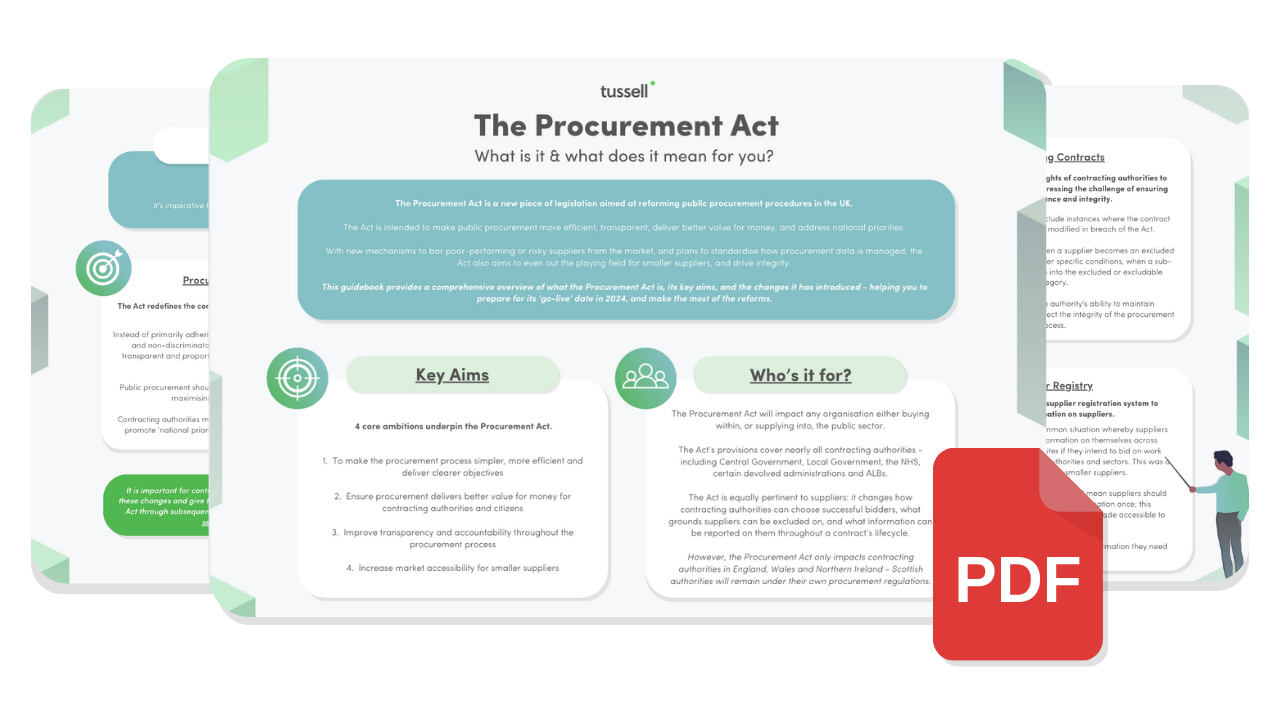Its official - The Labour Party has won the 2024 UK general election!
But what does the Labour Party manifesto say about public procurement and the Procurement Act 2023?
And, how will NHS, Central and Local Gov't procurement change under Sir Keir Starmer's new administration?
This first half of this article takes a deep dive into Labour's general election manifesto to uncover what the party has to say about UK public procurement.
The second half delves into other pledges made by the Labour party in the recently published Labour's Plan to Make Work Pay document. These additional promises are not present in the manifesto itself.
Watch our video summary on what Labour Manifesto means here:
Watch our summary of Labour's procurement pledges here
Or, skip ahead to read about:
🌹 The Labour Party's manifesto
Contract Fraud
Labour's manifesto commits the party to tackling procurement and contract fraud.
Citing controversial contracts awarded amidst the COVID-19 pandemic, the party promises to shut down "the link between ministers and an inside track for public contracts”.
They also promise to crack down on waste contracts and bring an end to “excessive” consultancy procurement.
Blue light procurement
The Labour Party lays out a new blue light strategy which includes the creation of a “Police Efficiency and Collaboration Programme”.
This new programme will standardise police procurement at a national level and establish shared services to reduce procurement costs.
Defence & industrial strategy
Labour also offers a new strategy for public sector defence procurement which focuses on supporting industrial priorities and building out robust supply chains.
This strategy will give priority to British defence suppliers and will establish new long-term partnerships with UK defence companies.
The Labour Party also commits to reform defence procurement to reduce waste.
SME Strategy
Labour also pledge to reform procurement rules to give SMEs greater access to government contracts.
Additionally, the Labour Party promises to take stronger action on public and private sector late payments (which disproportionately affect SMEs).
Uncover the top frameworks for SMEs in your sector
The NHS
The Labour party will develop a new NHS innovation and adoption strategy in England.
This strategy will include a plan for NHS procurement and will offer “a clearer route to get products into the NHS”.
A reformed NHS incentive structure will be introduced to drive innovation and speed up regulatory approval and procurement of new medicines and technologies.
💡 What does this all mean?
Labour's Manifesto includes a range of ambitious procurement pledges.
At the core of Labour's commitments is a view that public procurement has been used for self-interested or even fraudulent ends by the government.
In the wake of the COVID-19 pandemic, Labour were quick to criticise the government for utilising supposed 'VIP procurement lanes' to fast-track the awarding of PPE contracts to suppliers - several of which were found to have links to the Conservative party.
The manifesto's pledge to tackle 'contract fraud' reflects this long-held reservation.
This echoes one of the Party's key criticisms of the Procurement Act. During a March 2024 House of Commons debate on the 'Public procurement (British Goods and Services) Bill' , then Shadow Minister in the Cabinet Office Dame Nia Griffith argued that the Procurement Act "will allow the same wasteful approach to emergency contracting rules that we saw during the pandemic, with friends and donors of the Tory party given the first bite of the cherry".
These perceived inadequacies may also explain why Labour is committing to creating specific procurement plans for the Blue Light sector and the NHS - areas which the Party may view weren't given adequate attention under the Act.
***
Additional Labour Policy Commitments
Now that Labour has been elected, several additional procurement policy commitments have been made which were not present in the manifesto. These are as follows:
The formation of a new Social Value Council
Inspired by the Wales Social Partnership Council, Labour has pledged to introduce a Social Value Council made up of public, employer and trade union representatives.
The council "will be tasked with reviewing how social value can be better strengthened and delivered in public contracts."
Labour's new National Procurement Plan will mandate that social value be explicitly considered in public sector contract design.
Mandating consideration of social value will mean that organisations that prove their commitment to the following social value objectives will be favoured in the procurement process:
-
the creation of local jobs, skills and wealth
-
the equal and well treatment of worker, including on matters such as pay, conditions, trade union access,
-
the implementation of effective equality policies
-
adherence to high environmental standards and tax compliance.
Read Tussell's guide to social value and the Procurement Act 2023
A refocus on in-house service provision
Labour has pledged to examine public services that have been outsourced as part of their drive to improve the quality of public services and deliver better value for money.
The details of this policy are yet to be confirmed.
An expansion of the FOI Act
Finally, the Labour party has promised to increase transparency around public procurement by extending the FOI Act to include companies that hold contracts with the public sector.
The new rules would make private companies subject to the Act only in relation to information that is relevant to the public contracts they hold.
Conclusion
Many of the Labour Party's commitments are somewhat loose and yet to be fully defined.
However, this new era of British politics will likely usher in some significant reforms to public procurement.
A renewed focus on social value, a new 'National Procurement Plan', and changes to blue light, NHS and defence procurement each present the potential to radically reform the way the public sector buys.
Despite this fact, its Tussell's view that the Procurement Act will likely remain the biggest driver of change in public procurement this year.
Although it is possible that the Act's go-live date may change, suppliers and buyers alike would do well to keep preparing for the Act to come into effect on February 24th 2025.
🌳 Read the full 2024 Conservative Party manifesto.
🌹 Read the full 2024 Labour Party manifesto.
📜 Download Tussell's Free Procurement Act Guidebook.












.png?width=450&height=253&name=Labour%20Manifesto%20video%20v1%20(1).png)

.png?width=450&height=236&name=SME%20Frameworks%20(3).png)




